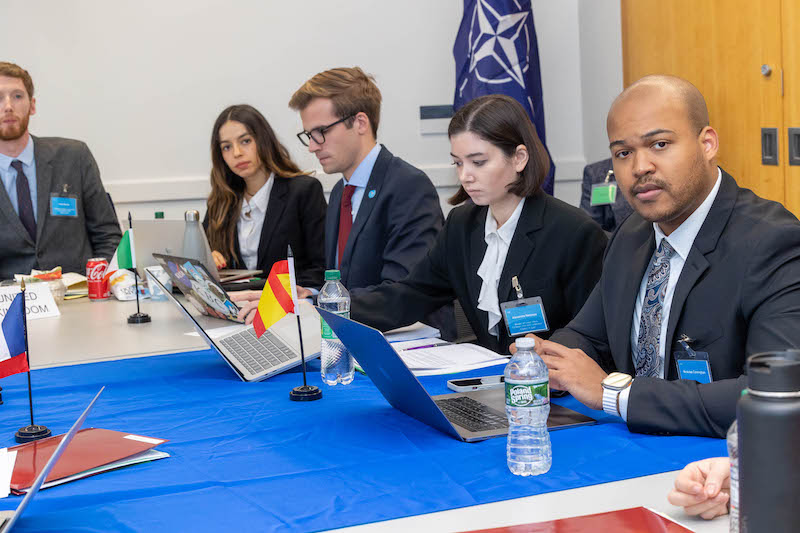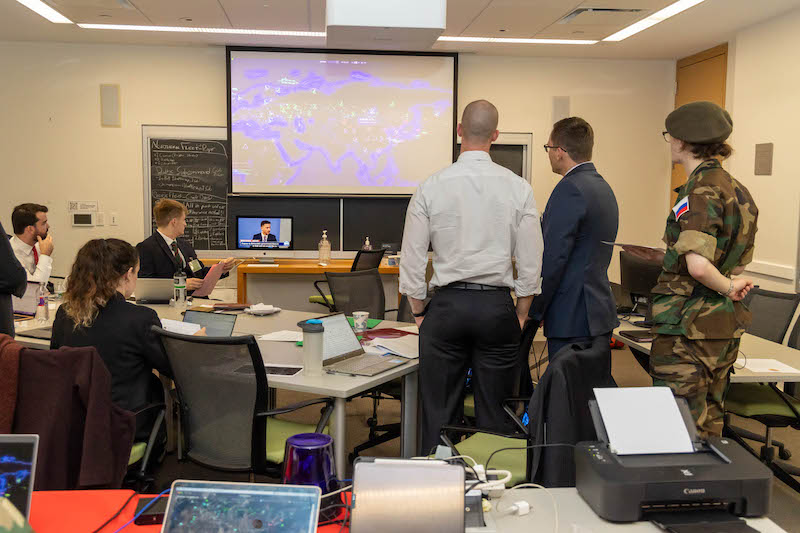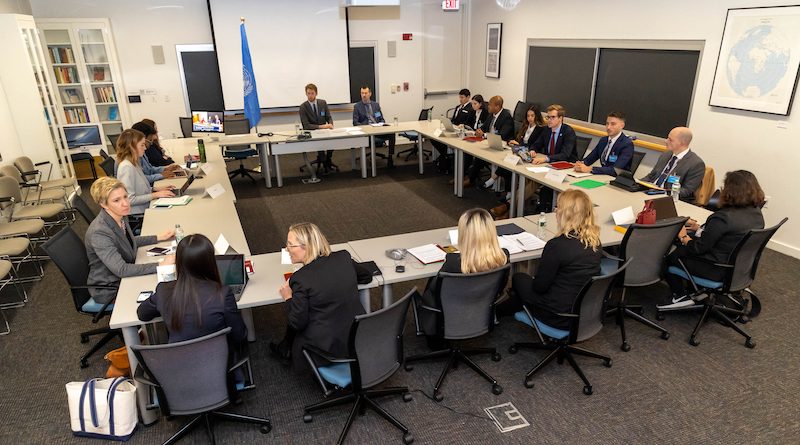Lessons from the Negotiation Task Force’s Red Horizon Exercise
By Vishal Manve, MALD 2023 Candidate, The Fletcher School
From December 9 to 11, 2022, I participated in the Negotiation Task Force (NTF) exercise “Red Horizon: Force and Diplomacy in Eurasia,” hosted by the Harvard University Davis Center for Russian and Eurasian Studies. The three-day exercise comprised participants from Harvard University, the Maxwell School of Citizenship and Public Affairs at Syracuse University, and private-sector security professionals. Many high-ranking military officers and visiting fellows from The Fletcher School also participated in the workshop. I attended the exercise with fellow students and course assistants from my class with the late former Secretary of Defense, Ash Carter.
The exercise consisted of an immersive educational simulation that replicated the geopolitical realities of the world through four different stakeholder groups, including the Russian Federation, NATO, the United States, and China. Participants were expected to engage realistically in multiple parallel scenarios, military actions, and diplomacy to further their geopolitical interests. The simulation also offered a holistic view of how government structures operate and engage with international organizations in decision-making on multiple issues, including the refugee crisis, nuclear security, conflicts in Eurasia, Asia, and Africa, and the role Western governments play in the decision-making calculus.
NTF staff, including Nora Cyra and Warisha Aslam, led training sessions on day one to immerse the participants in the Red Horizon universe and to prepare them for their specific roles. Arvid Bell, lecturer on government at Harvard University, led a masterclass on negotiation strategy and utilizing the concepts of Zone of Possible Agreements (ZOPA) and the Best Alternative to a Negotiated Agreement (BATNA) in our decision-making process. Participants then engaged in a pipeline deal simulation to use the ZOPA and BATNA concepts in real-time. This exercise helped me understand my personal leadership style, and the roles communication style and gender play in building consensus and achieving desired goals.
The training was followed by country briefings, which offered nuances of politics, alliances, and international security and geopolitical theories of conflict, and were led by Jon Wolfsthal, Sascha Hach , Marat Atnashev, and Arvid Bell for the U.S., NATO, the Russian Federation, and the People’s Republic of China respectively. The goal was simple: work with your alliances, build newer partnerships, and prevent all-out war and nuclear annihilation while dealing with new developments on the security front.

The action in the Red Horizon Universe began on day two. I played the role of the Foreign Minister of the Republic of Poland, representing domestic interests within NATO while also establishing relationships with the U.S. My primary goal was to focus on the survival of specific missile systems which had lower backing within NATO but would be crucial for Polish security and the prevention of Russian aggression. As we set the stage to establish various countries’ positions to the NATO secretary, we were hit with a significant technical hurdle that was not part of the simulation. Gmail servers went down in the Massachusetts region for the entire day, creating myriad communication issues between the NATO team and other groups on various issues, such as developments around refugee intake, budgeting, and the China-Russia unilateral decisions in Africa. To tackle this, we had to be nimble and quickly conduct 3D negotiations between NATO to figure out our individual and collective interests, and to “travel” with the help of our specialist Paola Silva, MALD ‘22. It was rather strange sitting in closed rooms for half an hour and pretending to travel while following protocol, but the team made the most of it by engaging in negotiations even during these times. I engaged with every delegation from the NATO member states, including the United States and even Russia, but had no engagement with China as our interests at this point were divergent.
Throughout the day, we were misled by the Russian teams, who organized meetings but never turned up. We never placed our full trust in them, instead engaging with them directly at the U.N. Security Council meetings. Meanwhile, the Chinese teams were huge and involved in their country-level political processes. We learned that balancing security, politics, and humanitarian actions while mapping major global developments is an extremely difficult task. As an astute politician or security professional, no amount of knowledge can predict what you will face on the ground, and placing trust in your alliances is crucial in the prevention of war.
As part of team NATO, we huddled together to quickly figure out our positions and to further prevent the escalation of hostilities in Africa and the Korean peninsula. By the end of the simulation, we became a tight-knit group that worked through our strengths and weaknesses and presented a united front to Russia and China. On the other hand, our alliance with the U.S. was weakened due to the initial lack of communication and working style. While NATO maintained a steady speed and respect for every member, the U.S. was very aggressive in its approach whenever American officials entered a room, and even announced a deal with the Russians without consulting their closest partners. The participants utilized every skill in their arsenal to make the exercise a realistic representation of the world.

On day three, we conducted multiple debriefing sessions within our teams and within the broader Red Horizon universe on successes, failures, and the gray areas of unresolved issues. The NATO team stood tall, and the U.S. Russia and China teams also performed exceedingly well, replicating political tools, disinformation campaigns, and other tools to make the simulation extremely high-paced and challenging.
I am deeply saddened by Professor Carter’s untimely death, but I am thankful for having the opportunity to be a part of his final Harvard Kennedy School class and to learn from his teaching style and insight. The gigantic reading list, cold callings, external congressional representatives, and speakers made the course unique and it was one of the best classes I have taken at Harvard. Without Professor Carter’s class, I would not have been a part of NTF’s Red Horizon Exercise. This challenging and academically fulfilling simulation taught me crucial nuances of humane leadership as the world enters a period of turmoil.
As the exercises concluded, Arvid Bell summarized the experience by saying, “You have new skills; now go out in the world and do good.” I believe every participant will do so wherever they are, and I encourage future Fletcher students to participate in the program to sharpen their negotiation skills.

